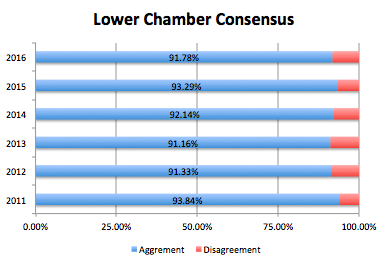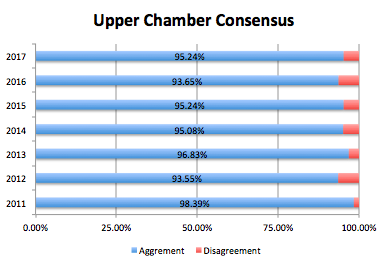The NY state legislature’s voting record exposes an odd fact: they all almost always agree. The Open States Project organizes all of the available legislative voting data, so you can pull it down and see for yourself. For the past six years, in all but a handful of cases, every bill introduced for a floor vote is passed and usually with a margin of about 90%. How could this be?
Here is the agreement rate for the lower chamber of the legislature:
And here is the agreement rate for the upper chamber of the legislature:
This is a mystery, and I do not have a good answer. I would expect some healthy discord and debate, resulting in voting records indicating closer outcomes and more bills that failed to pass. Instead, voting records indicate that in the past 7 years only 4 bills failed their floor votes in the lower chamber, and only 1 in the upper chambers. That is out of a total of 7269 votes for the lower chamber (so a 0.06% failure rate) and 11155 votes for the upper chamber (less than a 0.009% failure rate). And as demonstrated above, when they pass (which is overwhelmingly most of the time), they pass with a super majority.
What could be going on here? Here are a couple of theories:
- Voting is done in secret - votes could be conducted behind closed doors, without the record keeping that makes it transparent to the public. Seems unlikely, but if it were the case then they might only bring things to the floor which are certain to succeed.
- Top party members dicate the vote - if all of the power brokering is done at the top, and votes are decided by the party leadership ahead of time, you might expect there to be little recorded discent in the actual votes. But this implies that most state legislatures are sheep, and their only impact is the weight they give to their party leader.
- Voting no is is policitically non-viable - it could be the case that voting no on a bill is bad optics, and therefore every bill that makes it to a vote always gets a yes vote from everyone.
Or there is some other reason. But whatever the case may be, the consent and passage rate of the NY state legislature is a surprise, and challenges my assumptions of what a healthy democracy looks like.
ny politics opendata
